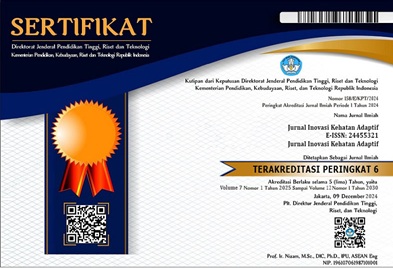PENGARUH PEMBERIAN EDUKASI FARMASI TERHADAP PENGETAHUAN DAN SIKAP PASIEN HIPERTENSI RAWAT JALAN DI RSUD PRINGSEWU
Kata Kunci:
Hipertensi, Edukasi, Pengetahuan, SikapAbstrak
Edukasi farmasi merupakan salah satu intervensi penting dalam pelayanan kesehatan yang bertujuan meningkatkan pemahaman pasien terkait penggunaan obat, kepatuhan terapi, serta penerapan gaya hidup sehat. Pada pasien hipertensi, edukasi berperan besar dalam membantu mereka memahami risiko komplikasi, pentingnya kepatuhan minum obat, dan perubahan perilaku yang mendukung pengendalian tekanan darah. Rendahnya pengetahuan dan sikap positif pasien dapat menghambat keberhasilan terapi, sehingga pemberian edukasi farmasi menjadi langkah strategis untuk meningkatkan kualitas hidup pasien. Penelitian ini bertujuan mengetahui pengaruh edukasi farmasi terhadap pengetahuan dan sikap pasien hipertensi rawat jalan di RSUD Pringsewu. Metode penelitian quasi experiment dengan desain pretest-posttest control group melibatkan 88 responden (44 intervensi, 44 kontrol) menggunakan Consecutive Sampling. Instrumen penelitian berupa kuesioner pengetahuan dan sikap, dianalisis data dilakukan secara univariat, bivariat, dan menggunakan Uji Wilcoxon. Hasil penelitian menunjukkan bahwa pada kelompok intervensi, rata-rata skor pengetahuan meningkat dari 7,48 menjadi 9,32 dengan nilai p-value 0,000 (<0,05), dan skor sikap meningkat dari 35,86 menjadi 43,57 dengan nilai p-value 0,000 (<0,05). Pemberian edukasi farmasi berpengaruh signifikan terhadap peningkatan pengetahuan dan sikap pasien hipertensi. Edukasi farmasi direkomendasikan untuk diintegrasikan dalam pelayanan rutin di RSUD Pringsewu guna mendukung pengelolaan hipertensi yang optimal.
Pharmaceutical education is one of the key interventions in healthcare services, aiming to improve patients’ understanding of medication use, treatment adherence, and the adoption of a healthy lifestyle. For hypertension patients, education plays a significant role in helping them understand the risks of complications, the importance of medication adherence, and behavior changes that support blood pressure control. Low levels of knowledge and positive attitudes among patients can hinder treatment success, making pharmaceutical education a strategic step to enhance patients’ quality of life. This research objective was to determine the effect of pharmaceutical education on the knowledge and attitudes of outpatient hypertension patients at the Pringsewu Regional Hospital. A quasi-experimental study was conducted using a pretest-posttest control group design, involving 88 respondents (44 in the intervention group and 44 in the control group) selected through Consecutive Sampling. The research instruments consisted of knowledge and attitude questionnaires. Data were analyzed univariately and bivariately using the Wilcoxon and Mann-Whitney tests. The results showed that in the intervention group, patients' knowledge improved from mostly in the “moderate” category to entirely in the “good” category after the education was given, with a p-value = 0.000. Patient attitudes also improved from mostly “moderate” to entirely “good” category, with a p-value = 0.000. The Mann-Whitney test confirmed a significant difference between the intervention and control groups in both knowledge and attitude variables, with a p-value = 0.000. in conclusion, pharmaceutical education ignificantly improved the knowledge and attitudes of hypertension patients. Therefore, it is recommended that pharmaceutical education be integrated into routine services to support optimal hypertension management at Pringsewu Regional Hospital.





